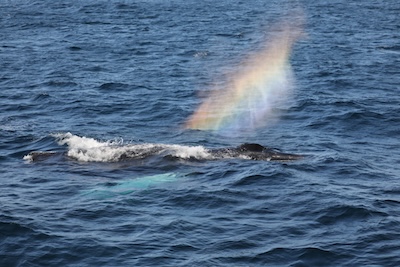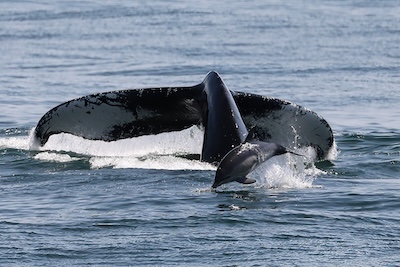September 2024
To know Marianne McNamara is to know her infectious energy, enthusiasm and endless love of nature. Ask her about her work with CRESLI and buckle up—because you are in for a treat. Professor of biology at Ammerman, Marianne has long captivated colleagues and friends with her stories about and eye-popping images of whales and dolphins off Long Island’s coasts through her work with the Coastal Research and Education Society of Long Island (CRESLI). Having Marianne’s family join us in years past on our family fossil hunting trips, we finally had the chance to go on a whale-watching tour with Marianne off Montauk in summer 2022. It was nothing short of awe inspiring. The immensity of watching a whale breach and splash so close to the boat, the thrill that spreads through the passengers every time someone yells that they’ve spotted a spout, the joy of watching pods of dolphins zip through the water—around, behind, even under the boat—it is breathtaking. On our trip, Marianne was the volunteer responsible for educating guests about the work of CRESLI and responding to the constant volley of questions about what the scientists onboard are seeing and doing, which she does in very friendly and accessible terms. Marianne completed a sabbatical last fall and recently told me how meaningful it was. While a general perception of sabbatical is a “semester off”—and to be fair, we know that sabbatical and Sabbath both stem from the Hebrew word for “rest”—a sabbatical means being reassigned from your regular job responsibilities to pursue an extensive work-related project on behalf of the college. “I am beyond honored and grateful to have been awarded that sabbatical,” Marianne began. Far from a semester of rest to merely recharge her batteries (a phrase we hear from colleagues), the sabbatical enabled Marianne to further her immersion into some deep-sea research. She learned more about the field of marine mammal biology and became an expert in the field in a relatively short time. Marianne’s work directly resulted in the creation of an impressive Excel spreadsheet from ArcGIS data of over 38,000 photographs, consisting of 56 worksheets compiling fifteen years of data across eight cetacean species and 243 whale watching trips. Marianne adds,
Given the necessary time away from her regular teaching load, Marianne has been able to personally identify (matched to other catalogs) over 75 individuals and provide critical assistance to CRESLI—specifically Dr. Artie Kopelman—after the Viking Fleet doubled the number of trips this summer. They were able to split not only the task of manning the vessel but also processing thousands of photographs post trip to organize and identify these whales individually. Those photographs are not just gorgeous to see on her Facebook page. Marianne shares them with other regional collaborators with whom she has developed an exceptional professional relationship, even attending a workshop with the Mid-Atlantic Humpback Whale Catalog curators in Virginia this past June. So, you see, her sabbatical semester was in fall 2023 but it has inspired significant scientific contributions since. Faculty still want and need professional development For the past seven years, I’ve served as co-chair of both the college sabbatical committee and the faculty development and retraining committee. For each, my co-chair is the Vice President of Academic Affairs and each team consists of three FA members and three administrators. Sabbatical applications are due by October 15 each fall, and faculty development and retraining applications are due by April 15 each spring. These contractual benefits were gained through the hard work of previous FA leaders, and we do not want to see them underutilized. However, a pattern we’ve noticed in both committees is a declining number of applicants. This trend had started prior to the pandemic—and of course during those pandemic years we understand why many things came to a standstill—but we find the continued low numbers of applicants worrisome. For the faculty development and retraining committee, this is worrisome because we want and need our members to stay current in their fields. Sometimes we think perhaps it’s because, for example, we have more members at the associate and full professor ranks than we do in the instructor and assistant professor ranks as well as more professional assistants at the PA2 versus the PA1 rank. As the college hires fewer new faculty, there are fewer people working their way up the promotion ranks. But even if you have been at the college for one, two or even three decades, our disciplines are always evolving—and of course we want our members staying abreast of the latest developments in their fields. So we encourage you to make use of your guaranteed contractual travel funding (currently at $2,200 every two years) and, as that amount becomes allocated to specific conferences and activities, you can apply for additional funding through our faculty development process each spring. Faculty development funding is not guaranteed, there is an application process, but even if you wish to simply attend a regional conference to learn new ideas, issues or techniques in your discipline, you can seek that additional funding through our committee. Sabbaticals: A deep dive Sabbaticals, for which full-time members are eligible to apply once every seven years, are harder to come by, as they should be. The FA contract allows for up to nine sabbaticals per year, and there have been a few years when we did see nine members receive sabbaticals. Contrary to popular belief, however, our sabbatical records show that the number of sabbatical awards have varied significantly from year to year. For example, in 2005-06 and 2006-07, only four were awarded each year. In 2010-11, nine faculty earned sabbaticals but in 2012-13 it was back down to four, then double that in 2013-14. A major change happened in 2017-18, however, when the college president at that time approved far fewer than the number recommended by our committee—and it seems that we haven’t really recovered since. To be clear, the contract mandates that our sabbatical committee members judge applications solely based on merit. Applications are blind, and we do not focus on things like department/area size or the college’s financial situation. In the past two years, however, only one FA member each time has been awarded a sabbatical. We understand, of course, that the college—like many community colleges across the nation—has been dealing with serious financial concerns, especially during and after the pandemic, including declining student enrollment, decreased state funding, increased employee healthcare costs and other pressures. Each faculty member who goes out for sabbatical work needs to have their classes or work assignments covered, which is a cost to the college. I would like to note another cost to the college, however, of not awarding sabbaticals. It is the cost of not having innovative projects completed that benefit the institution. It is the cost of lowered morale and lost opportunity to engage deeply in our professional fields, coming back energized post sabbatical. This enthusiasm and energy really is contagious. Students feel it, colleagues feel it and the college benefits in multiple ways from having our members conduct these kinds of intensive sabbatical projects. When members approach me and ask whether it is even worth their time to apply for a sabbatical or for faculty development and retraining, my response is always yes. I know those applications take time. I know it is profoundly disheartening to hear that your application was not successful, especially if it happens multiple years in a row. But the administration needs to see that the demand for these kinds of serious professional development opportunities remains strong. Fall 2024 sabbatical workshops I will be hosting my annual sabbatical workshops in September as follows, and the Zoom link will sent by email:
If you are interested in learning more about or applying for sabbatical, I am also happy to meet with members any time by appointment (in person, by phone or on Zoom); email me to set up a mutually convenient time to chat. I would love to see more faculty engaging in the kind of fulfilling deep-dive work that our colleague Marianne started last fall and has continued to enjoy. |


